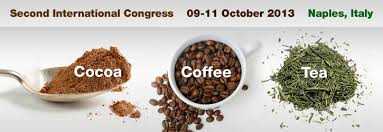Tagliazucchi D., Bellesia A., Conte A. Department of Life Sciences, University of Modena and Reggio Emilia, Reggio Emilia, Italy E-mail: avide.tagliazucchi@unimore.it Studies on the health benefits of cocoa have recently focused on the anti-diabetic potential of cocoa extract. The intake of cocoa
has been related to a reduction in thepost-prandial levels of blood glucose in diabetic rats [1]. A possible explanation for these observations is that cocoa extract possesses the ability to inhibit enzymes involved in the digestion of carbohydrate, attenuating the post-prandial increase in glycemia.
Using an in vitro model, the activity of rat intestinal α-glucosidase has been determined in the absence and presence of cocoa extract and fractions. The addition of cocoa extract inhibited α-glucosidase activity with an IC50 of 7.9 mg/mL.
The cocoa extract was further fractionated by ultrafiltration in a polyphenolic–rich fraction (<10 KDa) and a melanoidins-rich fraction (>10 KDa) [2]. Both the fractions were able to inhibit α-glucosidase with an IC50 of 2.3 and 3.9 mg/mL, respectively.
To identify the bioactive compounds, the polyphenolic–rich fraction was further fractionated with Sephadex LH-20 columns to separate tannins from low molecular weight flavanols. Furthermore, the melanoidins-rich fraction was separated in two fractions using ultrafiltration at 30 KDa.
All the obtained fractions were characterized for their ability to inhibit α-glucosidase and for their content in polyphenolic compounds.
References [1] Jalil, A.M.M. et al. Effect of cocoa extract on glucometabolism, oxidative stress, and antioxidant enzymes in obese-diabetic (ob-db) rats. J Agric Food Chem. 2008, 56, 7877–7884.
[2] Tagliazucchi, D. et al. Effect of dietary melanoidins on lipid peroxidation during simulated gastric digestion: their possible role in the prevention of oxidative damage. J Agric Food Chem. 2010, 58, 2513–2519.

















